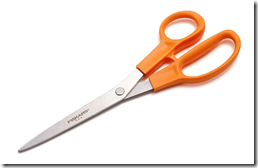The Wall Street Journal published a story last week entitled The Nerve-Racking, Soul-Searching, Exhilarating Process of Shopping for a Handbag, that I sort of find unbelievable and tragic.
In fact, for a while I thought it was a piece written for The Onion and cleverly disguised as a Wall Street Journal article.
The piece is essentially a treatise on a condition that writer Rachel Dodes labels Handbag Decision Paralysis, “a type of commitment phobia in the accessories milieu.”
Dodes paints a picture of women spending inordinate amounts of time and energy searching for a handbag thats price tag could feed a village in East Timor for a month.
I don’t understand it. Nor do I think anyone else should.
Dodes writes:
In a modern, mobile world, there's also something deeper going on with women and their bags, according to Judith Clark, professor of fashion and museology at the London College of Fashion. "On one level, it's this banal thing: How do I choose a handbag?" said Ms. Clark, who curated the permanent collection at the recently opened Simone Handbag Museum in Seoul. "But it's also a very intimate decision, having to do with the privacy that goes along with the inside of a bag." In picking a bag, we are in essence showing the world how we pay respect to the contents of our lives, and perhaps even ourselves.
I don’t care if Judith Clark is an accredited professor. This is insane.
First, who “pays respect” to the stuff they own? Am I to believe that a woman’s choice of handbag represents an outward demonstration of the degree to which she respects her iPhone or lip balm or Kindle?
A poor choice of handbag, therefore, reflects a flagrant disrespect for these items?
What does that even mean?
And am I also expected to believe that a woman’s choice of handbag reflects the amount of self respect that she possesses? Because if this is true, womankind is doomed.
If I were a woman, I would be outraged by statements like these, and as the father of a little girl, I am terrified to think that my daughter’s level of self respect and self worth might someday be measurable by her choice of handbag.
Professor Judith Clark was right. This is “a banal thing.” But not on just one level, as she states. All levels.
Equally insane is Rebecca Sinn, the 32-year-old editor at Glamour magazine who Dodes reports has been “eyeing the neat, top-handled Yves Saint Laurent Muse II bag for more than three years but just can't pull the trigger. She likened buying the bag, which costs about $1,500, to a ‘committing to adulthood,’ something that she's not quite ready to do.”
It’s a bag, Rebecca. Yes, it costs twice as much as the iPad that it is designed to carry (which is also insane), but it is nothing more than leather and fabric stitched together in order to carry personal belongings. Likening it to a “commitment to adulthood” is a clear indication that Rebecca Sinn does not know what adulthood is.
Then there is Dode’s friend, Julie, who began emailing her pictures of the large Proenza Schouler PS1.
“We started a lively debate over whether the bag was still "It"—and if it was, whether this was a good thing or not. I had seen versions of it on the flash-sale website Gilt.com, which is a mixed blessing for bag enthusiasts. On one hand, it means you can get the bag for about 30% off. On the other, the discounting is a signal that the bag could be nearing the end of its "It" run. I've carried bags past their invisible expiration date; it's a feeling akin to betting on the wrong horse at the Kentucky Derby.”
I can’t help but wonder (with near sincerity) if Dodes and her friend are still in high school.
A lively debate?
An “It” bag?
A handbag past its expiration date?
What the hell happened to seeing an item, liking an item, determining that the item matches your own sense of style and purchasing the item? What Dodes (and Julie) describe is a desire to find a bag that has enough popular people carrying to make it popular but not too many people carrying it to make it unpopular.
This is high school. Right? It’s the essence of high school.
It’s fairly judgmental for me to assume, but I cannot help but think that every woman involved in this piece, including Dodes, is an entitled, vapid, mindless, boring elitist who lacks an ounce of perspective or a modicum of self confidence.
Upon reflection, I’m sure that’s not entirely correct. Dodes and Sinn and Julie are probably lovely and interesting people with many unique qualities that they share with the world. I’m sure that their mothers love them and their friends think they are clever and adorable.
But when it comes to handbags (and possibly fashion in general), they are vapid, mindless, disgusting sheep.









